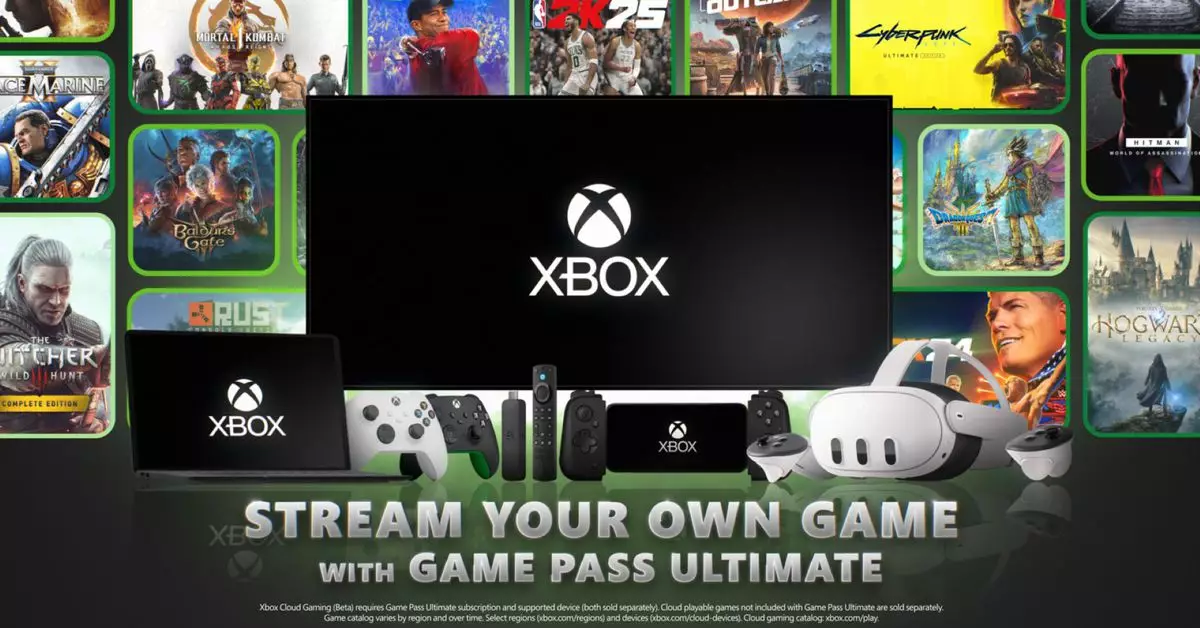In a noteworthy move that showcases Microsoft’s commitment to evolving its gaming platforms, the company recently announced the expansion of Xbox Cloud Gaming. Users with subscriptions to Xbox Game Pass Ultimate can now stream a diverse array of 50 games, including notable titles like Baldur’s Gate 3, various Final Fantasy installments, and Hogwarts Legacy. This initiative not only enhances the library of games accessible for streaming but also symbolizes a significant step towards Microsoft’s vision for a more expansive cloud gaming experience.
The introduction of these 50 games is merely the tip of the iceberg for Microsoft’s objectives in cloud gaming. Ashley McKissick, who holds the position of corporate vice president for Xbox Experiences and Platform Engineering, emphasized their ongoing efforts to curate a broad and diverse selection of games. This is not just a marketing strategy; it echoes a fundamental desire to make gaming more inclusive across various devices. Users can now enjoy their favorite titles on TVs, smartphones, tablets, and personal computers through a web browser.
This cross-platform accessibility breaks down barriers that have traditionally confined gaming to consoles or PCs, permitting a much wider audience to engage with Xbox offerings. Furthermore, there are plans to further enhance this initiative by streaming the Xbox library directly to consoles and the Xbox application on Windows starting next year. Such efforts to unify gaming access are commendable, and they might redefine how consumers perceive the gaming ecosystem.
The expansion of these cloud streaming capabilities is part of a broader project internally dubbed Project Lapland. It reflects years of strategic planning and development. Initially, the original Project xCloud aimed to introduce game library streaming back in 2020. However, due to various complex challenges, including technical hurdles and licensing agreements, the rollout has been delayed multiple times.
The significance of this launch cannot be overstated, as it marks a crucial pivot for Microsoft in the realm of gaming. The company’s ambition to provide users with access to thousands of titles signifies a commitment to not just cloud gaming but also to ensuring that the players can retain and enjoy their existing game ownership in a cloud environment. The details provided by insiders reveal the intricate balancing act that Microsoft is undertaking: managing save files, regular game updates, and meticulously preparing their bespoke Xbox cloud servers.
However, as promising as this initiative is, potential challenges loom on the horizon. Some publishers are reportedly hesitant to allow their games onto the platform due to pre-existing licensing agreements. This could limit the breadth of titles available, which is a notable consideration as Microsoft endeavors to transform Xbox Cloud Gaming into a quintessential platform for gamers worldwide.
Another hurdle arises from the Xbox ecosystem on mobile devices. While Microsoft has plans to integrate game purchases into its Android mobile app, recent judicial developments have created uncertainty. An earlier court ruling paving the way for Microsoft to bypass Google Play Billing was met with a temporary administrative stay, casting doubt on the timeline for this feature’s implementation. This scenario underscores the persistent challenges that disrupt the gaming industry, often deriving from complex regulatory landscapes.
Looking ahead, the future of Xbox Cloud Gaming is riddled with both promise and uncertainty. If Microsoft can successfully navigate the landscape marked by publisher agreements and adaptive technological frameworks, it stands to set a new benchmark for the gaming industry. The trajectory of Xbox Cloud Gaming could lead to an unprecedented shift in how games are consumed and accessed, promoting a culture of inclusivity and innovation in the gaming landscape.
As the gaming industry continues to evolve, users can look forward to being part of a more interconnected and accessible gaming experience, with Microsoft at the forefront of this transformation. The forthcoming expansions, coupled with the integration of user feedback and industry collaborations, could very well herald a new era for digital gaming—one where the boundaries of where and how games can be played are persistently pushed, creating an enriching environment for gamers everywhere.

